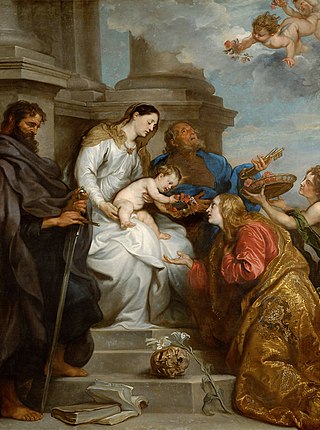
Rosalia, nicknamed la Santuzza, is the patron saint of Palermo in Italy, Camargo in Chihuahua, and three towns in Venezuela: El Hatillo, Zuata, and El Playón. She is especially important internationally as a saint invoked in times of plague. From 2020 onwards she has been invoked by some citizens of Palermo to protect the city from COVID-19.

Beatrice is a female given name. The English variant is derived from the French Béatrice, which came from the Latin Beatrix, which means "blessed one".
Francesca is an Italian female given name, derived from the Latin male name Franciscus meaning 'the Frenchman' It is widely used in most Romance languages, including Italian, French and Catalan, and place of origin is Italy. It is derived from the same source as the female name Frances, and the male names Francesc, Francesco and Francis.
Rosalia or Rosalía may refer to:
Mariano is a masculine name from the Romance languages, corresponding to the feminine Mariana.
Lia is a feminine given name. In the Spanish-speaking world, it is accented Lía. In English-speaking countries, the name may be a variant of Leah or Lea. Lia may be a diminutive of various names including Julia, Cecilia, Amelia, Talia, Cornelia, Ophelia, Rosalia / Roselia, Natalia, Aurelia, Adalia / Adelia, Ailia, Apulia, Alia / Aleah. In Hebrew, the name means to me, God and is also the Israeli version of the English pronunciation of Leah or Lea. It can also be a surname.

Ivan is a Slavic male given name, connected with the variant of the Greek name Iōánnēs from Hebrew יוֹחָנָן Yôḥānnān meaning 'God is gracious'. It is associated worldwide with Slavic countries. The earliest person known to bear the name was the Bulgarian Saint Ivan of Rila.
Leah is a feminine given name of Hebrew origin. Its meaning is often deciphered as "delicate" or "weary". The name can be traced back to the Biblical matriarch Leah, one of the two wives of Jacob. This name may derive from Hebrew: לֵאָה, romanized: lē’ah, presumably cognate with Akkadian 𒀖littu, meaning 'wild cow', from Proto-Semitic *layʾ-at- ~ laʾay-at- 'cow'.

Emily is a feminine given name derived from the Roman family name "Aemilius", and is the feminine form of the name Emil.
The name Rosanna is the combination of Rosa (Rose) and Anna.
Melania is a feminine given name that derives from the Greek word μελανία (melania) meaning "black, dark".

Rose is a female given name. It is a late Latin name derived from rosa, meaning "rose". Variants are Rosa, Rosario, Rosie, Rosalba, Rosalie, Rosalia, Rosina, Rosaria, Rosalyn and Rosalina. Similar names are Rosanna and Rosamunde. It may be a short form of Rosemary, Roseanne and Rosemond.

Laura is a traditionally feminine given name in Europe and the Americas, of Latin origin, whose meaning is a metonym for a victor, and an early hypocorism from Laurel and Lauren.

Rosalnice is a village on the left bank of the Kolpa River, east of the town of Metlika in the White Carniola area of southeastern Slovenia, on the border with Croatia. The railway line from Novo Mesto to Karlovac runs through the settlement before it crosses the Kolpa River into Croatia. The entire area is part of the traditional region of Lower Carniola and is now included in the Southeast Slovenia Statistical Region.
Antonia, Antónia, Antônia, or Antonía is a feminine given name and a surname. It is of Roman origin, used as the name of women of the Antonius family. Its meaning is "priceless", "praiseworthy" and "beautiful". Antonia is a Croatian, Danish, Dutch, English, Faroese, Finnish, German, Italian, Norwegian, Polish, Romanian, Spanish, and Swedish name used in the United States, most of Canada, the Latin American states, Australia, New Zealand, Papua New Guinea, Indonesia, Philippines, Peninsular Malaysia, Singapore, India, Pakistan, Spain, Italy, Austria, Germany, Belgium, Netherlands, Poland, Romania, Bulgaria, Moldova, part of Serbia, Nordic countries, Greenland, Estonia, Republic of Karelia, South Africa, Namibia, Botswana, Zimbabwe, Zambia, Malawi, Tanzania, Uganda, Kenya, South Sudan, Sudan, and Ethiopia.
Regina is a Late Latin feminine name meaning "queen" from the Latin, Italian and Romanian word meaning the same. Regina was the name of an early Christian saint.
Lea is a feminine given name. In French, the name Léa is from the biblical name Leah. In Spanish, the same name is Lía, and in Italian, Lia. In English, it is a name for the word 'lea', pronounced [liː], meaning pasture or meadow.

Rosalía Vila Tobella, known mononymously as Rosalía, is a Spanish singer, songwriter, producer, and musician. She has been described as an "atypical pop star" due to her genre-bending musical styles. After being enthralled by Spanish folk music at age 14, she studied musicology at Catalonia College of Music while also performing at musical bars and weddings.

"Yo x Ti, Tú x Mí" is a song by Spanish singer Rosalía and Puerto Rican singer Ozuna. Written by both performers alongside El Guincho and produced by the latter with the help of Frank Dukes, the track was released as a single on August 15, 2019, through Columbia Records. Continuing the journey and exploration of Rosalía to urban music that "Con Altura" started, it reached number one in the singer's home country, becoming her fifth number-one single and her fourth consecutive number-one. It later won two Latin Grammy Awards for Best Urban Song and Best Urban Fusion/Performance, the second consecutive time Rosalía won those categories and Ozuna's first Grammy.

"Con Altura" is a song by Spanish singer Rosalía and Colombian singer J Balvin, featuring Spanish producer el Guincho. Written by Rosalía, Balvin, Aury "Mariachi Budda" Pineda, el Guincho, Frank Dukes, Teo Halm, and Sky Rompiendo and produced by the last four alongside the Spanish singer, the song was released by Columbia Records on 28 March 2019.










